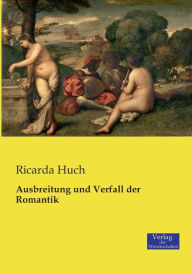Ricarda Huch
Ricarda Huch was a pioneering German intellectual. Trained as a historian, and the author of many works of European history, she also wrote novels, poems, and a play.
Huch was born in Braunschweig and died in Schönberg in the Taunus (today, part
... Read more
Ricarda Huch was a pioneering German intellectual. Trained as a historian, and the author of many works of European history, she also wrote novels, poems, and a play.
Huch was born in Braunschweig and died in Schönberg in the Taunus (today, part of Kronberg). She was the daughter of Richard Huch, a wholesale merchant, and his wife Emilie (née Haehn). She also used the pseudonym Richard Hugo and published her first poems under the alias R. Ith Carda. She prepared for university work privately and studied in Zürich, where she received her doctorate in 1891. Her brother, Rudolf, and her cousins, Friedrich and Felix, were also well-known writers.
Huch studied philosophy, history and philology at Zürich University, as women were not then eligible for degrees at German universities. In 1890, she was one of the first women to attain a doctorate from Zurich with a dissertation on "The neutrality of the Confederation during the Spanish War of Succession" (Die Neutralität der Eidgenossenschaft während des spanischen Erbfolgekrieges). Shortly after attaining her doctorate, she published poetry under the alias of Richard Hugo. After working as a librarian, Huch left for Bremen, where she taught German and history. She later moved to Vienna and in 1898, she married Ermanno Ceconi, an Italian dentist. She moved to his Italian homeland of Trieste for several years, where they had a daughter, but they divorced in 1906. She later married her brother-in-law and cousin, the writer Richard Huch.
Huch was a member of the "Preußische Akademie der Künste", but resigned in 1933 when the National Socialists seized power and began purging the Academy. Huch left after Alfred Döblin quit. Despite her critical attitude to the new régime, Joseph Goebbels and Adolf Hitler sent her congratulatory telegrams on her 80th birthday. Huch dedicated much of her life to Italian, German and Russian history and historical novels that were psychological biographies. In 1947, she was an honorary president of the First German Writers Congress in Berlin.
Less




